Who Is Christopher Nkunku?
Christopher Nkunku’s first season in the Bundesliga has seen him become an incredibly important part of Julian Nagelsmann’s RB Leipzig, who are pushing for the title despite this being Nagelsmann’s first year at Leipzig.
Nkunku came to RB Leipzig from Paris Saint-Germain for a reported $15 million in July, joining a contingent of young French players in the squad.
Nkunku’s time at PSG, despite coming through their youth ranks, was not filled with triumphs — he featured in 29 matches for PSG across all competitions, scoring four goals and registering two assists under Thomas Tuchel.
While Tuchel is known for his tactical acumen, the 22-year-old’s time under Julian Nagelsmann has brought about a burgeoning talent: Nkunku has made 30 total appearances, scoring four goals and providing a total of 15 assists so far this season.
This scouting report looks to provide some analysis as to how Julian Nagelsmann has helped the young Frenchmen grow into a key component of Leipzig’s success.
Christopher Nkunku Style Of Play
Nkunku’s progression this season has been a joy to watch as he has helped lead RB Leipzig’s surprising success.
His attacking statistics support the notion that he has been a key contributor, as he leads the team with his 11 assists in the Bundesliga, currently putting him in third in the entire league behind Jadon Sancho and Thomas Müller.
He also averages 2.8 key passes per game, meaning he creates almost three potential scoring opportunities for every 90 minutes he plays.
Nkunku’s longer key passes double those of his closest teammate (Marcel Sabitzer), indicating his ability to see space farther in front of him into which he can play the ball.
He’s also created nine more key passes than Sabitzer, despite playing almost 600 fewer minutes in the Bundesliga this season.
His forward passes in his opponent’s half are completed at a success rate of 92.4%, which makes him a dangerous option for RB Leipzig.
In terms of his defensive contribution, an often derided subject, Nkunku averages 4.77 duels won for every 90 minutes played, while also earning 4.21 recoveries in his opponent’s half. He also has an interception rate of 2.39 passes per 90 minutes played, clearly indicating his defensive struggles are much exaggerated.
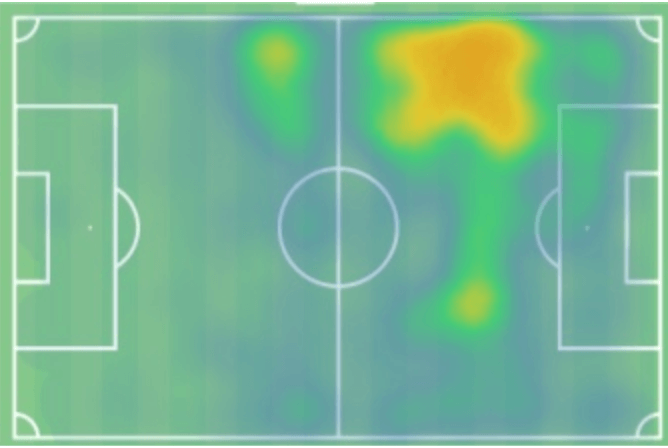
Nkunku’s tactical flexibility in Julian Nagelsmann’s system has helped him develop as a player this year.
The Frenchman has played a total of seven different positions, with his primary role being a left winger or an attacking midfielder.
That being said, he has also featured almost everywhere else in the attack from most of the forward positions, except as the main striker, to any of the roles in the midfield, except for the holding midfielder.
One of the main keys to his success is his ability to create and find space for himself to receive the ball in dangerous positions.
Christopher Nkunku Spacing & Goal Scoring Ability
His ability to exploit space makes Nkunku an exciting option as a goalscorer.
While he has only scored four this season, the way in which he gets involved makes him a wonderful option, especially for coaches who are looking for players who can find and exploit space.
Against Mainz, Nkunku had a wonderful goal just outside the box on the left side.
Timo Werner, on the left side of the pitch, received the ball at his feet from a cross.
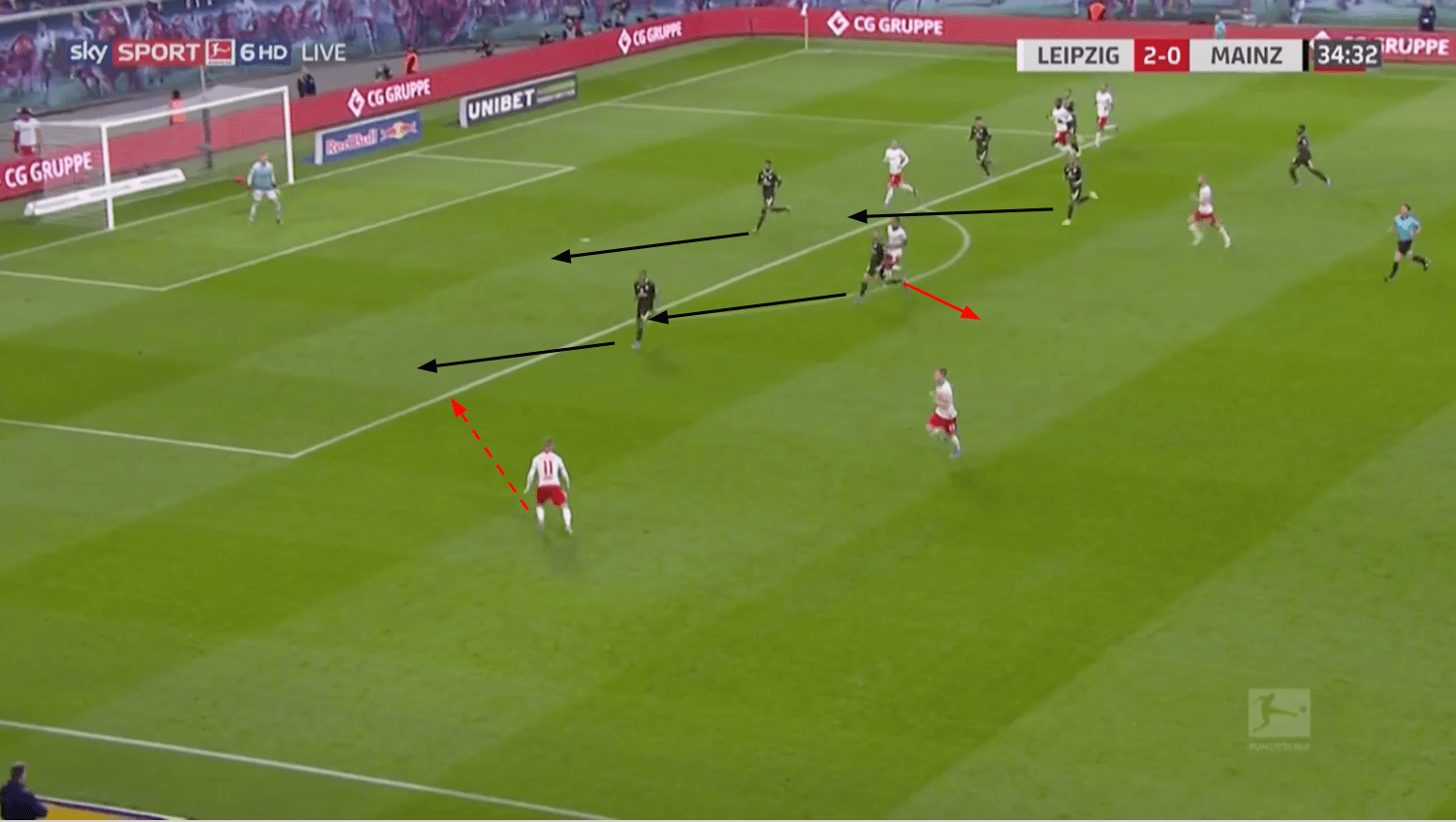
As he did, Mainz’s defensive block shifted over as a unit.
As they shifted, Nkunku scanned the area four times to take in as much information as possible, where he recognised that their primary focus was to stay compact.
As they came across to the left, Nkunku drifts in the opposite direction, causing defenders to have to “pass” him off to one another.
After moving right, he then took a few steps back, finding himself at the top of the box with no defender in sight.
When he receives the ball from Werner, Mainz’s defender rushes out to block his shot, but it’s too late: Nkunku lasered it into the back of the net.
His goal against Leverkusen earlier this season also highlights his ability to manipulate space to his advantage.
His first movement in the goal highlighted his intelligence as he looked to force defenders to make decisions: something that makes their job much more challenging.
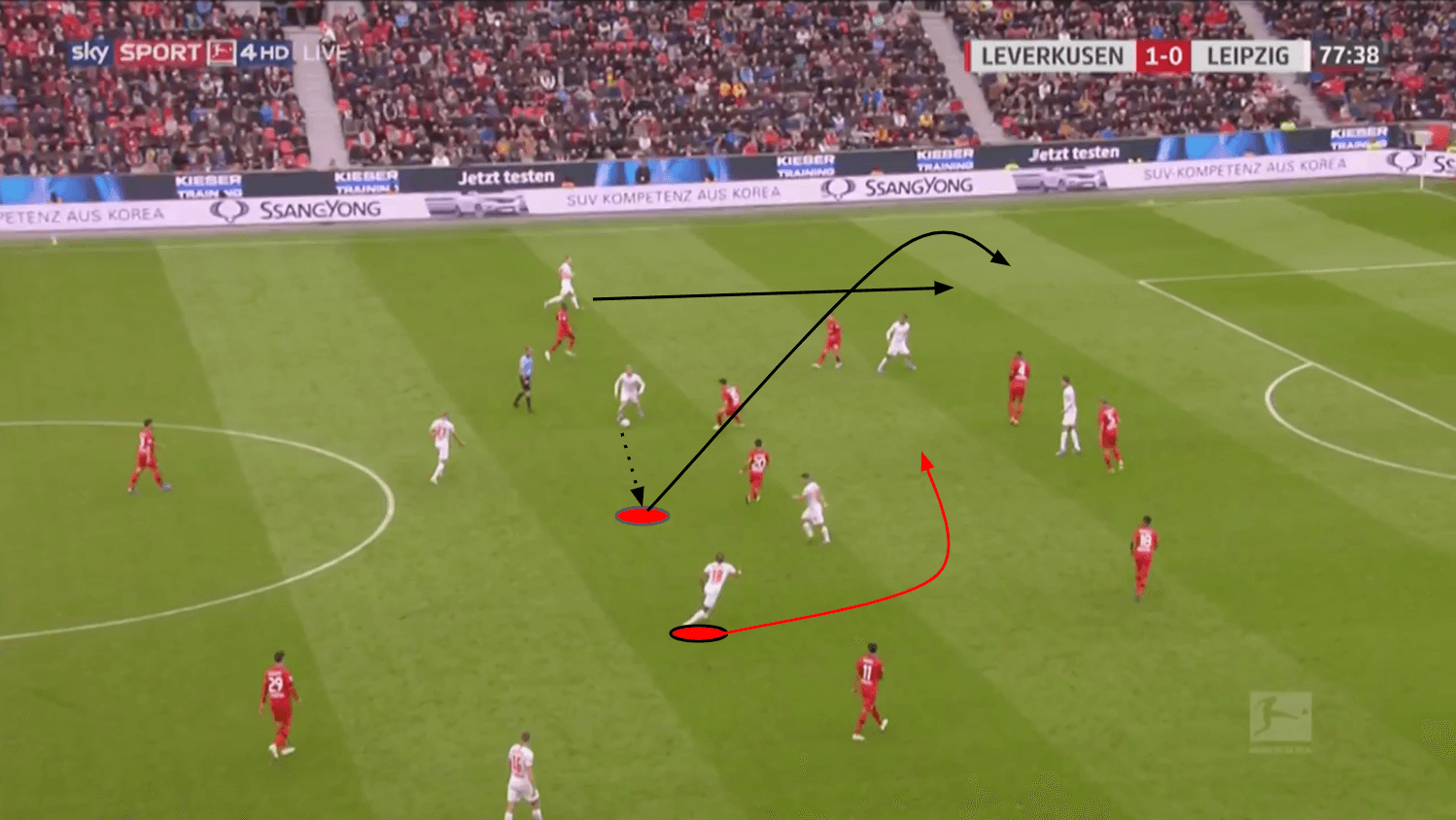
As his teammate gained possession in the midfield, Nkunku checked into the space between the lines of defenders.
While he didn’t instantly receive the ball, he remained patient and allowed for the play to build.
As the ball was sent out wide to Werner, Nkunku didn’t sprint ahead to try and get into the box immediately; instead, he allowed his two central teammates in front of him to draw the attention of the Leverkusen defenders.
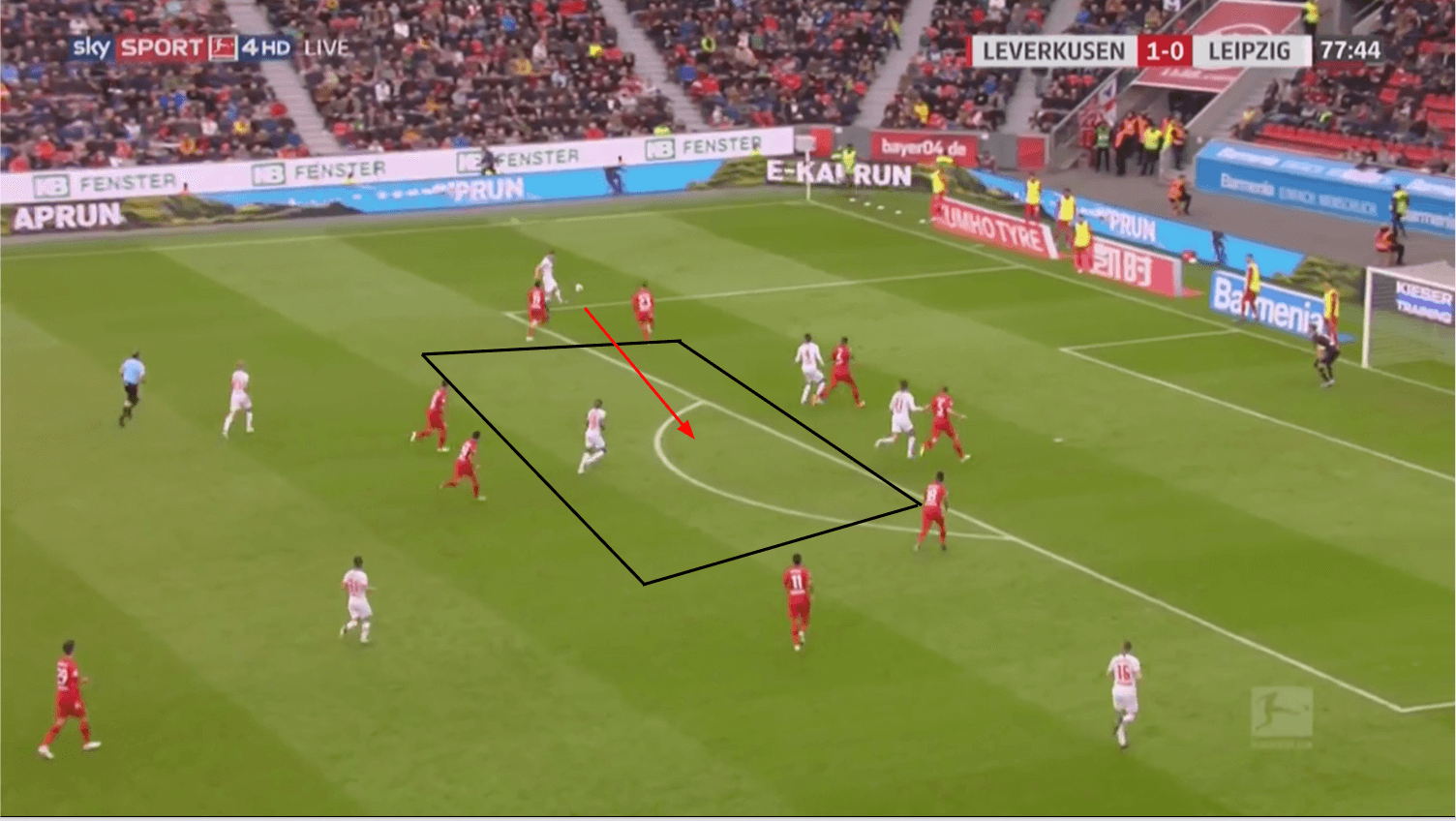
With those two defenders being occupied, Nkunku found himself between the two lines with no one around him, as the Leverkusen midfielders had failed to drop off and mark him.
By the time they realised that he was wide open, it was too late.
Werner crossed the ball, and Nkunku, despite his awkward first touch, is able to finish the chance and bring RB Leipzig level.
His goal versus Union Berlin also demonstrated his ability to create space by making a series of runs that move defenders out of the way.
This manipulation of the opponent becomes incredibly useful for a team when other players can recognise what their teammate is doing, as it opens up areas for them to attack.
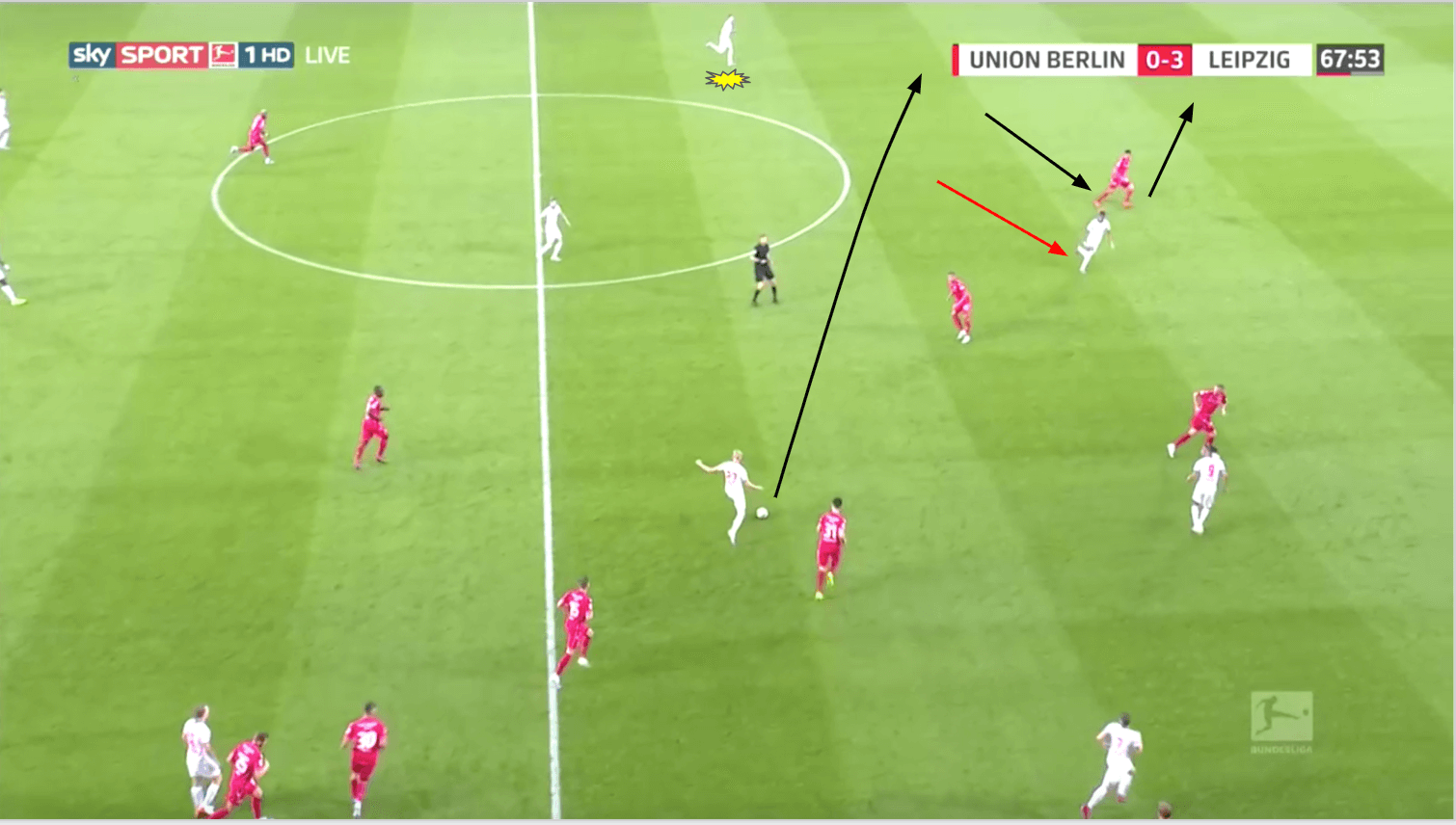
Nkunku’s movements set up his goal, as his teammates were able to take advantage of the space he created.
First, Nkunku checked towards the ball, dragging the centre back with him.
As the centre-back followed, the ball was sent into the space that the defender had just left.
Marcel Halstenberg, the man highlighted in yellow, ran into that space, and the centre-back was forced to recover back towards Halstenberg with a longer sprint.
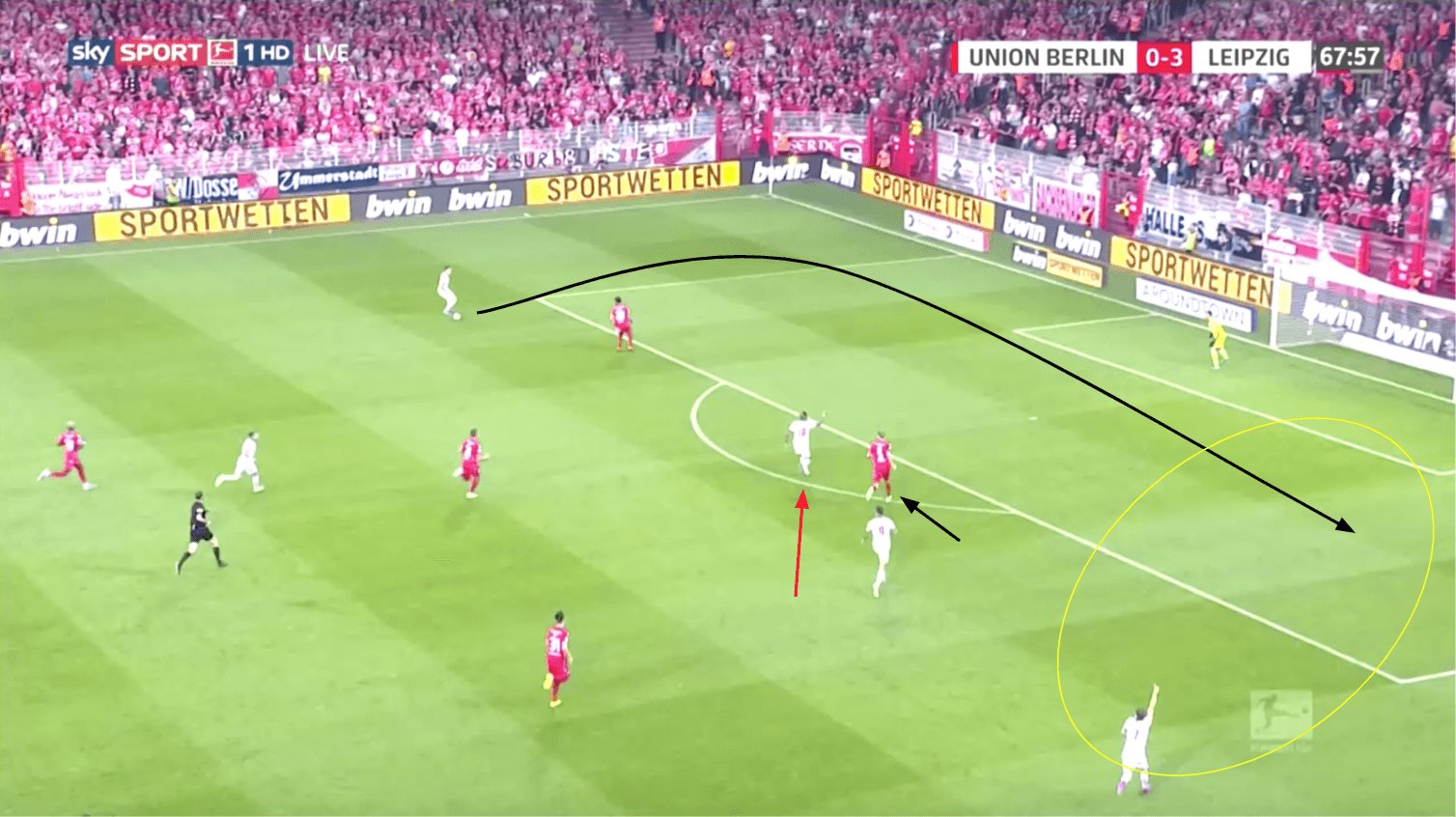
As Halstenberg received the pass, Nkunku began his run towards him, bringing the other central defender along with him.
Because of his proximity to the goal, the defender had no choice but to follow him, which opened up space on the far post where two RB Leipzig players were waiting.
Halstenberg sends the ball across the box to Marcel Sabitzer.
The defender that had just been dragged towards the left side of the pitch now focuses on marking Yussuf Poulsen, who was directly in front of him.
This allowed Nkunku to essentially walk to the back post completely unmarked to receive Sabitzer’s headed cross, which gave Leipzig their fourth goal of the match.
Patience on the ball leads to chances
Christopher Nkunku’s manipulation of space makes him a threat to score, but he causes significantly more problems for opponents with his distribution of the ball.
Nkunku is responsible for a majority of the free kicks and in-swinging corners from the left side of the pitch for RB Leipzig, which some would argue helps enlarge his assist numbers, which is of course true.
His delivery is so consistent that it’s no wonder that RB Leipzig have scored the second most set-piece goals in the Bundesliga so far this season.
While his ability to provide quality service is demonstrated consistently, His patience on the ball, quite a significant attribute for a 22-year-old, makes him a constant threat when the ball is in play.
Nkunku has demonstrated his unique ability to utilise the football made famous by footballers like Andres Iniesta, Xavi Hernandez, and Johan Cruyff: “La Pausa.” The use of La Pausa or “The Pause” simultaneously allows the game situation to develop while the ball carrier attracts defender(s).
While Christopher Nkunku didn’t develop at Barcelona’s La Masia, he has clearly developed this particular skill and uses it to create opportunities and devastate opponents.
The first instance he demonstrated this skill was against Schalke 04, a match in which Nkunku had a total of four assists.
His last assist to Emil Forsberg was a beauty.
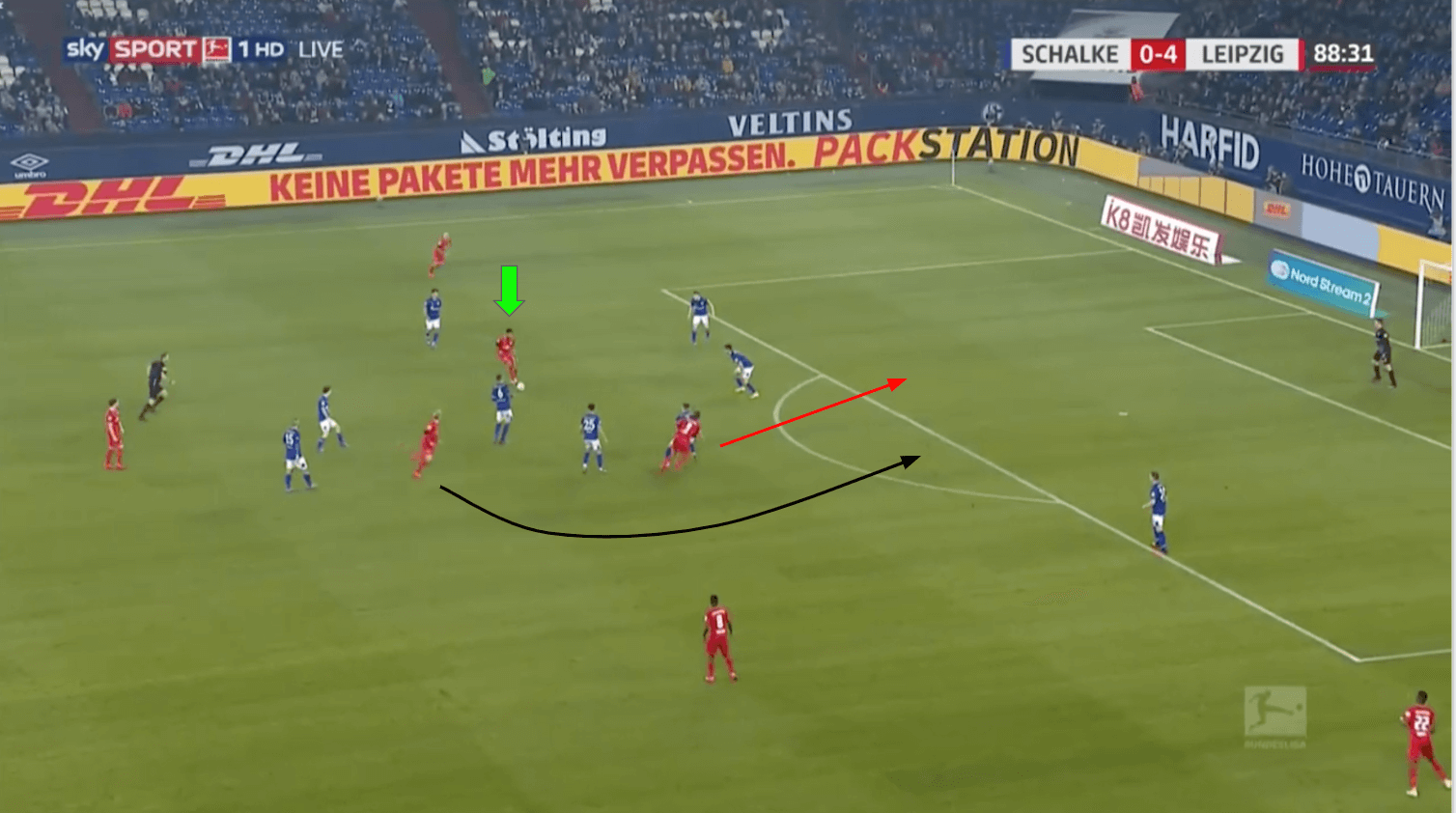
Nkunku received the ball at his feet after Yussuf Poulsen laid it off.
Poulsen then made the run in red, where he appeared to have already beaten his man with his speed.
Nkunku could have played the through ball in an attempt to put Poulsen through.
Instead, he executes La Pausa perfectly.
Poulsen made his run, and as he did, he brought his defender with him.
Nkunku even feigned the pass to Poulsen to freeze defenders; as he did, space opened up for Emil Forsberg to make his run.
Nkunku split two defenders with his pass, and Forsberg was through on goal.
Nkunku also used La Pausa earlier this season against Bayern Munich, where he drew two defenders towards him at the edge of the box, allowing his teammates to adjust their runs to get open for a cross that was eventually put over the bar.
Nkunku used a similar move to create a chance against Lyon in the Champions League.
Again, his patience on the ball allowed his teammates to adjust their movement and find space to receive the pass.
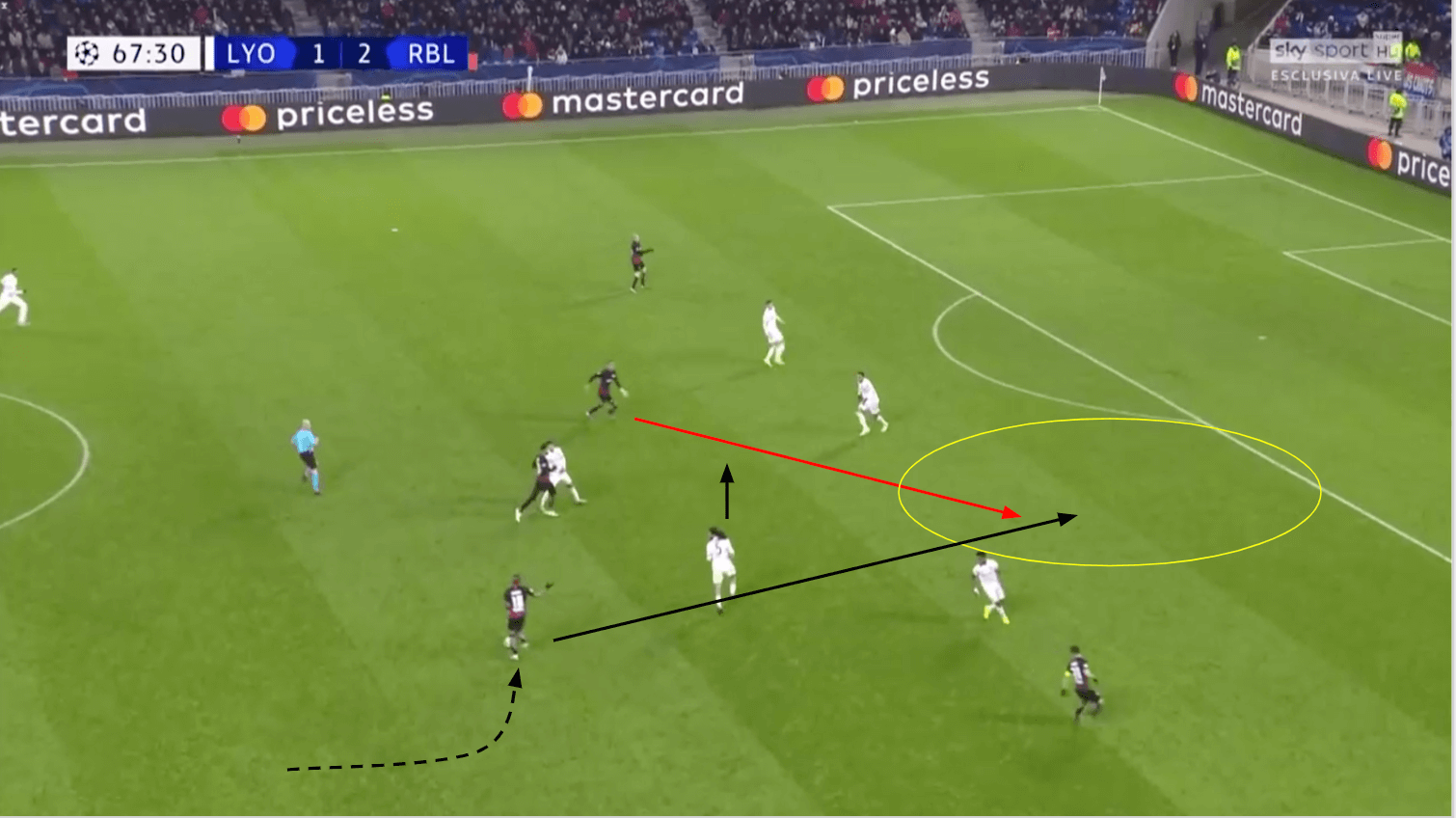
The play started off with Nkunku driving towards the centre of the pitch, forcing defenders to recover at speed.
He then slowed his touch down and essentially stopped as Lyon continued to recover, leaving him in a lot of space by himself.
As he stopped, his forward, Yussuf Poulsen, was initially calling for the ball in the centre of the pitch, right where all the Lyon defenders were standing.
Nkunku recognised the space available between the outside back and centre back, and directed Poulsen there.
In the image, you can actually see him pointing to where he wanted Poulsen to go.
Instead of attracting attention, Nkunku used La Pausa to free himself from defenders and then slotted a pass to his teammate, who ultimately shot the ball wide of the net.
Nkunku’s ability to read his teammates’ movements and see space to be exploited makes him one of the best young players in the game.
He demonstrated his ability to do so against Zenit in the Champions League when setting up a teammate with a quick reading of the game.
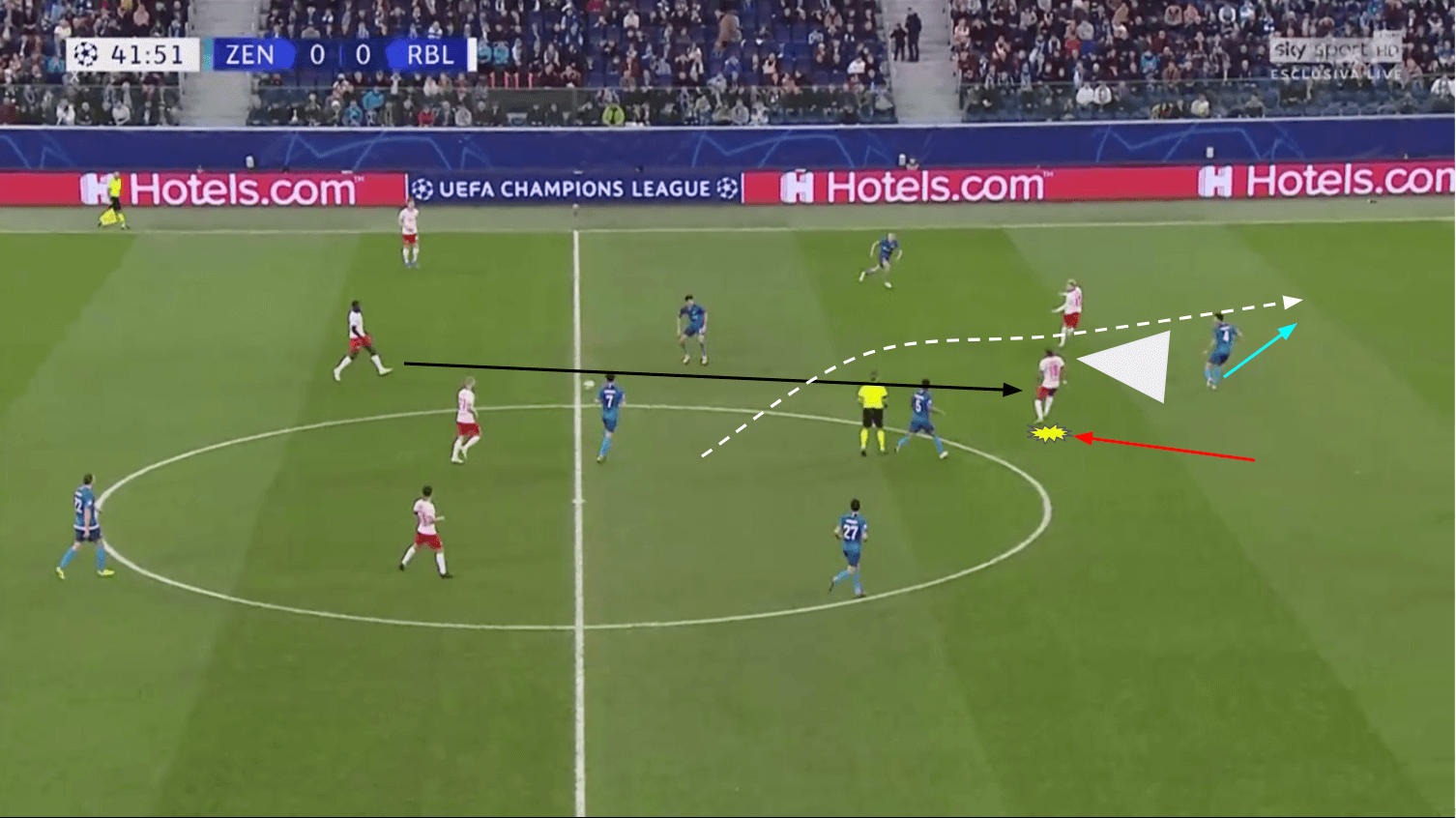
Dayot Upamecano, another young talent for RB Leipzig, progressed the ball up the pitch.
As he did, Emil Forsberg checked out of the space in the centre of the pitch, dragging his defender with him.
Executing a perfect rotation, Nkunku timed his run well and checked into the space that was no longer occupied.
What’s important about this image is that as Nkunku checked the space, he had his head turned to see where his teammates and opponents were located.
Even though the ball was on its way to him, Nkunku took a quick snapshot of what was in front of him; when he received the ball, he already knew where he wanted to put it.
All it took for him was one touch to control Upamecano’s pass, and then he played a perfectly weighted ball to Forsberg, whose shot was blocked by the Zenit goalkeeper.
Christopher Nkunku Defensive Abilites
One final thing to be addressed about Nkunku is his defensive work.
Statistically, people will write him off as not being the strongest defensively.
This must be taken into consideration with the position that he plays, as well as the team in which he plays.
His position, normally as a winger or a centre midfielder, doesn’t provide him with a lot of opportunities to get stuck into tackles.
Instead, most of the time he is used as an attacker whose primary function is not to win back balls for his teammates that high up the pitch.
It’s also important to consider the team he plays for, as Julian Nagelsmann has traditionally liked to play with a high press in an attempt to either force their opponents to turn possession over in their own half, or to result in a long pass in the air, which then gives Leipzig a solid statistical opportunity to win back possession.
That being said, Nkunku’s role in RB Leipzig’s high press is incredibly important in their ability to dominate opponents.
Nkunku’s positioning often requires more brainpower than anything, mirroring the defensive mantra of famed Italian defender Paolo Maldini: “If I have to make a tackle, then I have already made a mistake.”
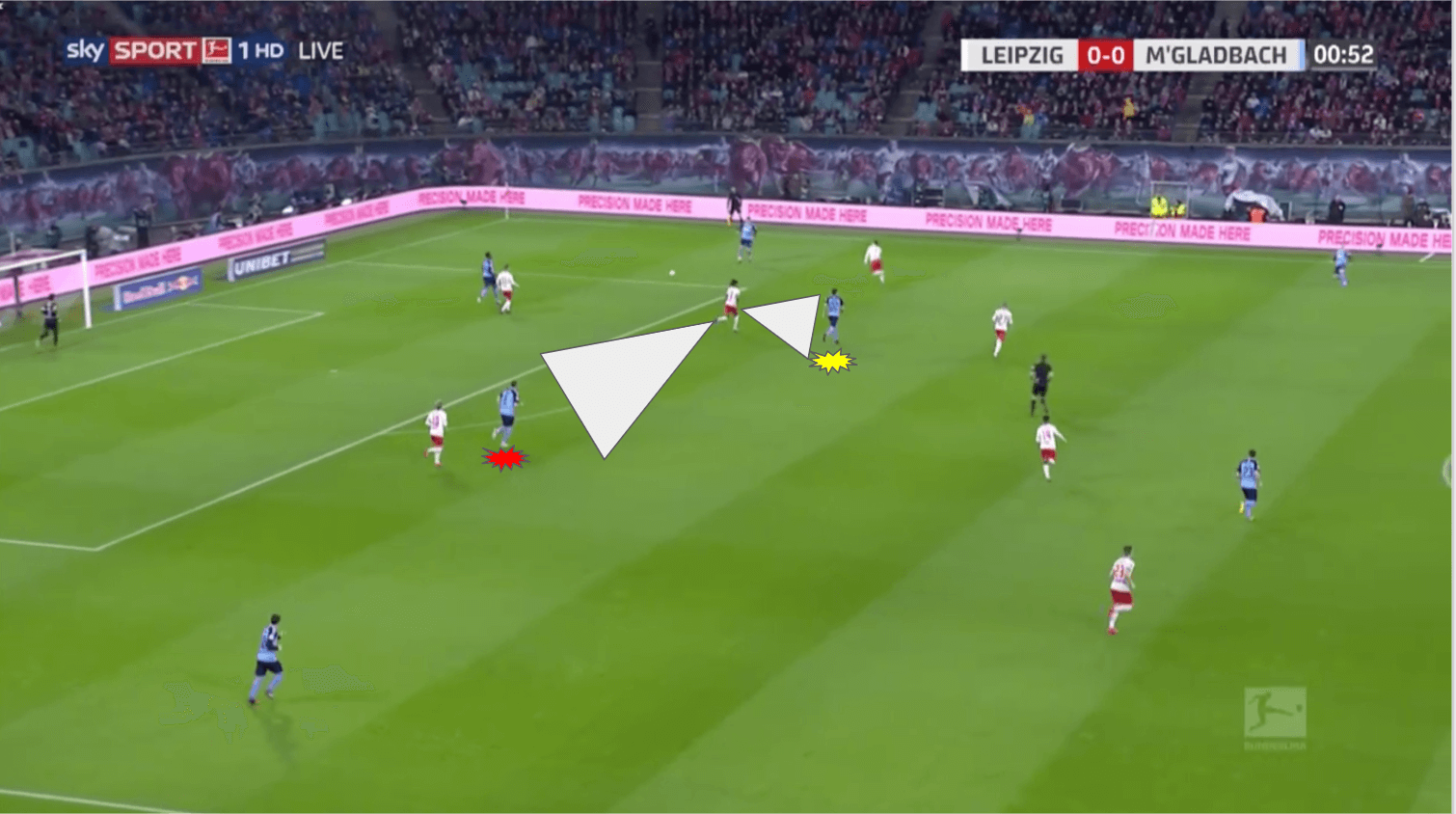
In the image from the match against Borussia Mönchengladbach, Nkunku’s positioning in the centre of the press successfully eliminates two players from receiving the ball by proper use of his cover shadow, which means he is blocking potential passing lanes.
His spacing is incredibly important: he’s close enough to the man marked in yellow to intercept any pass, although he seemed to be inviting that pass by leaving some distance between him and the Gladbach player.
If the man on the ball tried to squeeze in a pass, Nkunku was there to intercept and attack, which would be a devastating attack because of RB Leipzig’s fantastic pressing positions.
While baiting that pass, Nkunku also gave himself enough room to eliminate the man marked with red as a passing option.
If the Gladbach player tried to play that longer pass, there was a good chance Nkunku would step in and intercept it, most likely with devastating results.
Much like his ability to change attacking positions, Nkunku can also perform defensive coverage in the high press against multiple styles of play when building out of the back is concerned.
In the UEFA Champions League match against Tottenham, Leipzig didn’t press often, as Mourinho looked to avoid any potential errors by sending the ball longer in the air.
However, when they did press, Nkunku was tasked with attempting to prevent play through the middle of the pitch, despite the fact that the two midfielders, in this case Harry Winks and Giovani Lo Celso, had a numerical advantage against him.

As Spurs tried to overload him, Nkunku outwitted them and helped win possession back for Leipzig.
Nkunku began by closely marking Lo Celso while keeping an eye on Winks.
As Winks moved out of Patrik Schick’s cover shadow and into the space that Schick left, Nkunku then decided to follow, knowing that Schick was no longer preventing Winks from receiving the ball.
As Nkunku stepped to Winks, he made sure to use his cover shadow, effectively eliminating Lo Celso as a passing option in this instance.
By constantly checking his shoulder, Nkunku has demonstrated time and time again that his positioning is some of the best in the Bundesliga at the moment.
By excelling at this, he of course creates wonderful scoring opportunities, but he also becomes a crucial part of the high press that RB Leipzig play with on a weekly basis.
Conclusion
Christopher Nkunku is a talented young man who has thrived under Julian Nagelsmann’s leadership and tactics at RB Leipzig.
The 22-year-old is having his best season yet in football, despite it being his first one where he sees regular game time.
This consistent playing time has led to what most would consider to be a surprise success of Leipzig’s season.
If he continues to learn and grow under Nagelsmann, it won’t be long before big-name European clubs come in to pay a hefty price for the young Frenchman’s services.





Comments